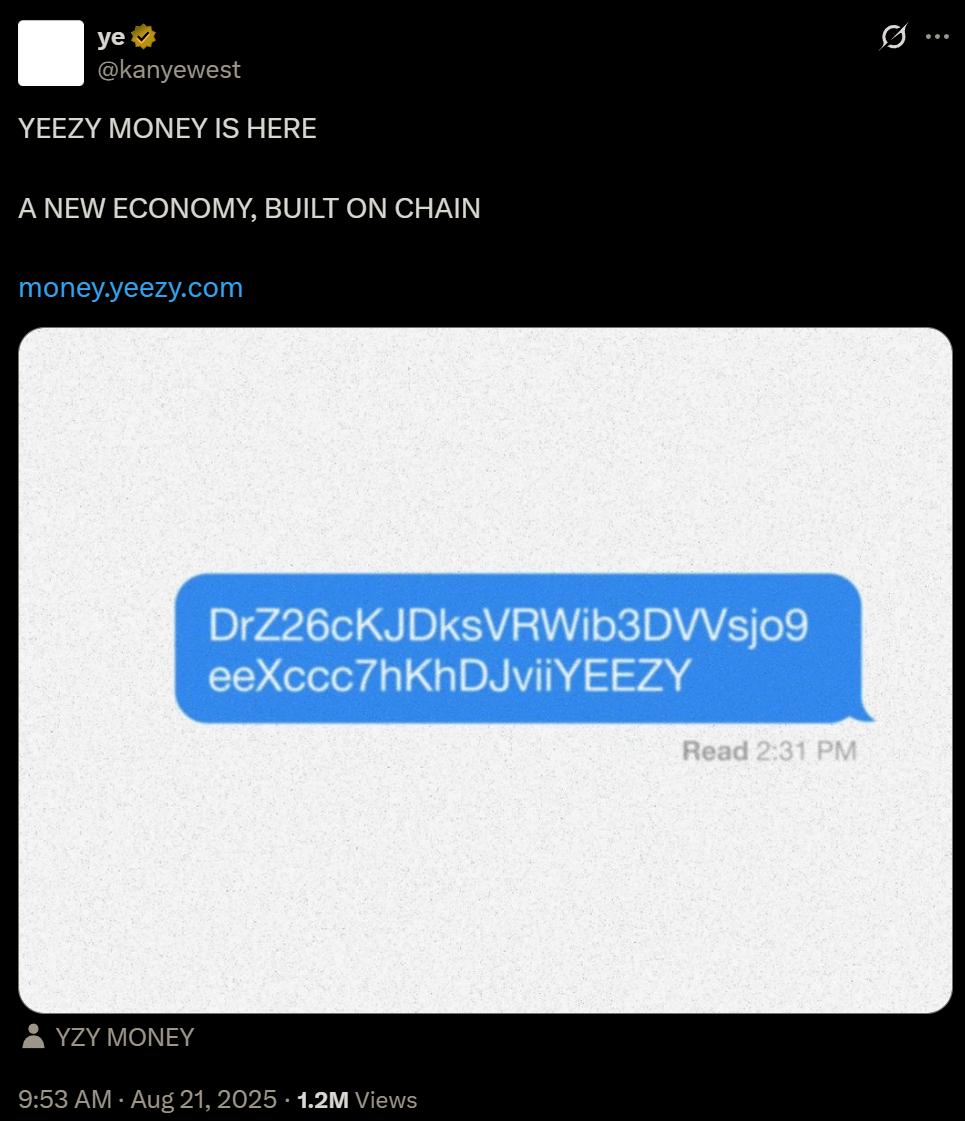Written by: J1N, Techub News
Famous singer Kanye West (Ye) has officially launched the cryptocurrency project YZY Money and its token YZY. The project claims that YZY is issued based on Solana with a random contract mechanism to prevent front-running. The team's share will be released through locked and phased unlocking. Payments can be made through Ye Pay and YZY Card. Within just one hour of its launch, YZY's market value broke through $3 billion, with a surge of 1414.8%. BitMEX co-founder Arthur Hayes even posted on social media that he has bought YZY and jokingly said, "Please don't rug me". As of writing, GMGN market data shows that YZY has dropped to $0.97, with a 70% decline in just 2 hours.


Unlike previous celebrity token launches, Ye has introduced YZY Money, Ye Pay, and YZY Card, seemingly attempting to align with Trump's WLFI and add supposed application scenarios to the token. More notably, the official documentation for YZY Money includes a "class action waiver" clause, explicitly requiring users to waive their right to join class action lawsuits and bear related legal costs. This rare clause indicates that the YZY project considered potential legal risks from the outset, trying to protect the project with an institutionalized "defense mechanism".
Behind this seemingly tight layout and comprehensive application scenarios...
Lookonchain tweeted that despite Kanye's official announcement, the liquidity pool only contains YZY itself, without USDC. This means developers can flexibly manipulate YZY by continuously adding or removing liquidity, similar to the previous LIBRA project. Multiple insider wallets apparently pre-positioned, with one 6MNWV8 address attempting to buy YZY a day in advance. On the launch day, this wallet bought 1.29 million YZY at $0.35 per token using 450,611 USDC, then sold 1.04 million for $1.39 million, leaving about 249,907 YZY (worth about $600,000), with an initial profit of over $1.5 million.
The surface "fair token distribution" is actually a reality of capital and information asymmetry manipulation. Like previous celebrity token launches, it has become a race for retail investors. Looking at Kanye's past methods, these operations are not surprising.
Back in February, Kanye West exposed on X platform that someone offered $2 million to promote a Memecoin, intending to scam his fans. He not only firmly refused but also publicly shared the chat records, stating he would "not issue tokens" and only do products he likes and understands. He criticized tokens as being similar to sneaker speculation, essentially deceiving young fans.
However, things quickly reversed. Weeks later, media reported that Kanye was preparing his own cryptocurrency YZY, with a distribution plan showing he would receive 70% of the shares and bind the token to the Yeezy brand as a payment tool. Subsequently, he announced on Twitter plans to launch an official Meme coin, even hinting at a token called "Swasticoin". Meanwhile, Kanye's account behavior became increasingly abnormal: frequently retweeting CZ's tweets before suddenly unfollowing, then following other fund founders; most tweets were deleted, leaving only a few related to CZ. These unusual operations led to speculation about whether his account was taken over, with rumors that he might have sold the account publishing rights to the BarkMeta team for $20 million. Although Kanye denied this, the controversy persisted.
In fact, this is not the first time Kanye has "flip-flopped" in the crypto space. As early as 2021, he sold music works and merchandise through NFTs, then high-profile denied NFTs, saying he would focus on real-world creation. However, just months later, he applied for metaverse and Non-Fungible Token-related trademarks and even deleted his previous negative comments. Such wavering made it difficult for outsiders to judge his true stance, greatly damaging his credibility among fans.
Looking at these cases, similar to Jay Chou's "Jay Bear" Non-Fungible Token, Edison Chen's zombie Non-Fungible Token, or NBA star Shaquille O'Neal's DAO project Astrals, these celebrity-led projects once led a speculative boom but almost invariably ended in failure. History has told us that regardless of the celebrity's popularity or the novelty of the theme, these influencer-led token or Non-Fungible Token routes are destined to fail in creating long-term value, and instead appear more like a short-term capital game of "fan economy harvesting".








